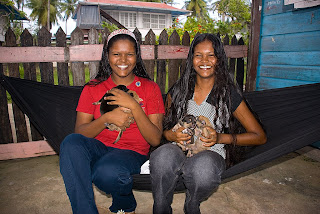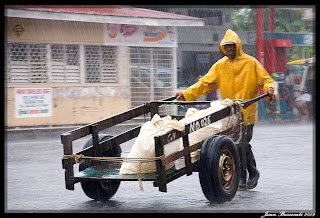Ah. There had to be SOMETHING this unfunctioningly, obstructively, mundanely, boringly awful- every country has. If it isn't the driving licence office, and it isn't the VAT office, and it isn't the bank, it must be the Post Office.
First, you get a piece of paper delivered to your address telling you you have a parcel. You are forewarned that it will cost 500 Guyanese dollars collection fee, plus whatever they deem appropriate for duty and taxes, unspecified at this point.
You then plod off to the central post office. Imagine the filthy concrete corridor outside the dark grey concrete toilet block in a spectacularly run-down old concrete comprehensive school. That's the front entrance of the national Post Office. You find your window. Opposite the window is a row of chairs, identical to the ones in Lewisham hospital A&E. People have the same expression on their faces too- a kind of pained, hopeless boredom that has a spark of anger in it.
Hand over your leaflet to a girl trained in eye contact avoidance. Her whole being, it seems, is awash with despair. She walks the walk of the doomed, talks like someone who has worked in a Jobcentre for FAR too long, looks at your leaflet as one imagines Mary Queen of Scots looking at her own death warrant, minus the drama. Huge sigh. Says something that sounds like "yaweyeee".
"Sorry?"
Another long sigh, this time fetched deep from the abyss of a well-practised diaphragm. "Y'all got ID?"
Hand over passport. Writes number, very very slowly on to your slip.
Walks away. No, 'walks' is far too dynamic a verb. 'Drifts' is good except it sounds too noncholant. How about 'dearths'? Yes, she dearths off (slowly of course) to seek your parcel. About ten minutes later, just as you've fought your way into a Lewisham hospital chair, your name is called.
"Brassome?" You watch as they chop into your parcel with a huge knife and not too much care. The belongings are rooted through, to mild curiosity from fellow queue-ees. The biro is wafted along your pale trousers that escaped the knife.
Unexplained hiatus. Everyone in the queue is unconsciously assimilating the MQofS/ Post Office Sigh.
Customs officer comes out and roots through your parcel. Leaves.
Second unexplained hiatus.
Opportunity to give thanks for learning the beautiful gift of patience.
And now your slip comes back, with an utterly arbitrary figure written on it for 'duty', and another for 'VAT'. Everything in the parcel is VAT exempt, and duty exempt too as far as I can tell, but since it costs less than last time, I don't argue.
"Hurray!", you think. Done.
Ah no.
Next, the parcel is re-taped and put on another table.
Third unexplained hiatus.
Next, you get called forward, with all the verve and charm of Eeyore on a very, very bad day. You pay for your parcel. "Hurray!", you think. Really done this time.
Not so.
Now you join your final queue, with the slip received from the payment, to sign in a Large Exercise Book before receiving your parcel.
As you walk (exhaustedly or gaily, depending on your temperament and length of time in captivity) to the exit, you remember a conversation with a Jesuit yesterday about the Horrid Internet, and how it has led to the death of the Lovely Post Office, and how young people now don't engage with the present because they can remain in past lives with contact through the internet. I say, God bless the internet. And P.S.- please don't ever post me anything!
x

 I was engrossed in Gerald Durrell's "Three Singles to Adventure", telling of his animal-collecting escapades/ escapology in Guyana in the 1950s. Would I be stupid enough to trade my own 21st century adventures for a vicarious trip through someone else's, fifty years ago? Almost certainly.
I was engrossed in Gerald Durrell's "Three Singles to Adventure", telling of his animal-collecting escapades/ escapology in Guyana in the 1950s. Would I be stupid enough to trade my own 21st century adventures for a vicarious trip through someone else's, fifty years ago? Almost certainly. 

 We saw the riders sheltering together under a large tarpaulin, skinny tyres shying away from the sheet water. We guessed they would postpone the start, so we set off to see the Essequibo river.
We saw the riders sheltering together under a large tarpaulin, skinny tyres shying away from the sheet water. We guessed they would postpone the start, so we set off to see the Essequibo river.
